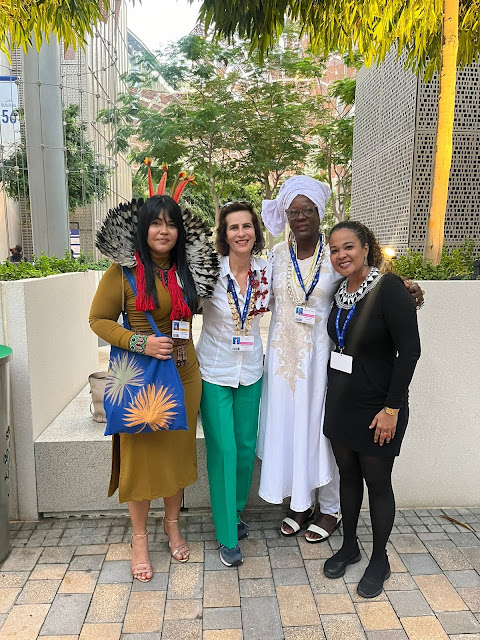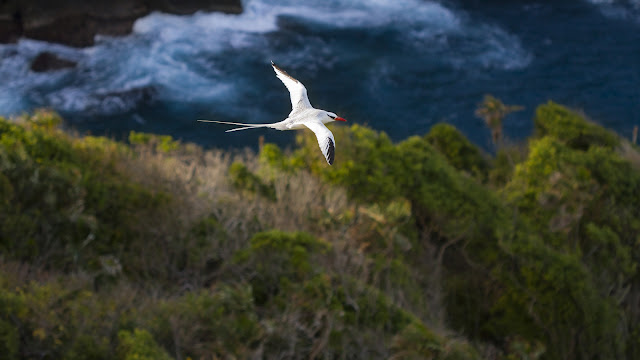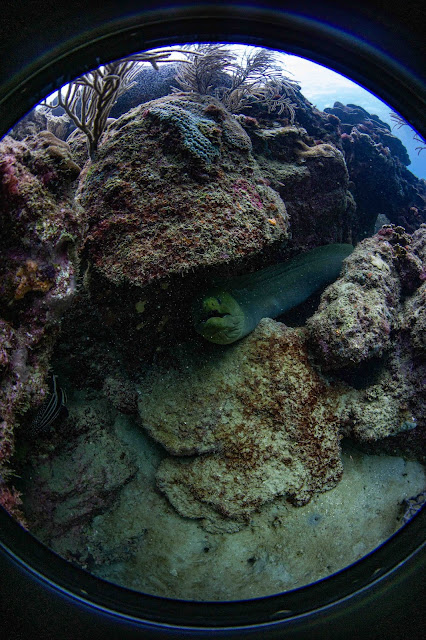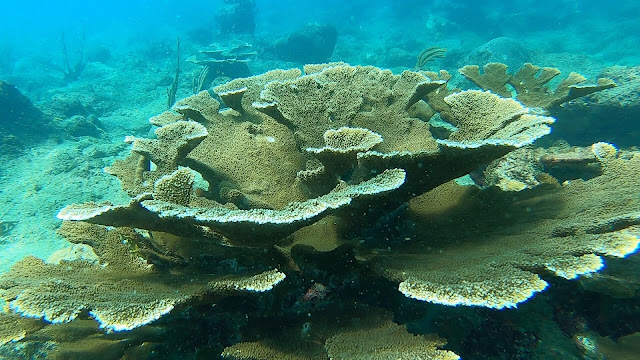COP 28: The Climate Conference in Dubai
Caroline Mair-Toby talks about COP 28 and the discussions to avert the global climate crisis.
Photos courtesy Caroline Mair-Toby
Caroline Mair-Toby first attended the COP (the UN Climate Change Conference held annually since 1995) as part of the London-based Legal Response International team in 2011 on behalf of Small Island Developing States. She has been part of the Trinidad and Tobago delegation as legal advisor and negotiator; and expresses relief that the Loss and Damage negotiations were finally operationalized and funded at the recent COP 28. She chose to visit civil society and indigenous peoples’ gatherings in the 2023 meetings. It was, she reports, the most organized COP ever, on a beautifully laid out site extending over many acres, requiring “Carnival level walking.” COP 28 was staged in Dubai from November 30 to December 13, 2023.
Mair-Toby is a lawyer for over 14 years, and has more than a decade of experience and research in climate diplomacy at the UNFCC climate negotiations. She recalls many years focused on the nitty-gritty of language in order to find consensus and common ground for diverse interests, some diametrically opposed. On the recent occasion, she was able to take a high level view of the conference which has evolved into a decades long drama involving representatives from 197 countries for the future of peoples on the earth.

Caroline
Mair-Toby being interviewed by Cultural Survival, which advocates Indigenous
rights and culture since 1972
Small Islands Advocate
At COP 28 in 2023, the first time in almost 30 years, the language of the agreements included acknowledgement of fossil fuels and linked them with climate change. The lobby for the oil and gas producing countries led by OPEC (Organisation of Petroleum Exporting Countries) was very strategic, very strong. But AOSIS (Alliance of Small Island States), stood their ground. “It could be the beginning of the end of the fossil fuel era,” she thinks, but is wary of good intentions. It is possible to be “intending to intend” for a very long time, since no end date to fossil fuels has yet been agreed.
She is also very concerned that “1.5 to stay alive” which had been led by Caribbean scientists, proposed by Small Island States and which continues to be the significant goal for countries to set and stay within some boundaries for emissions may be forgotten or watered down in the shift of focus to fossil fuel phase out.
She
is keenly aware that strategies and negotiations are crafted at many levels,
concealing hidden agendas and powerful interests. Experienced negotiators who
are wise to many tactics, unspoken intentions and manipulations are being
replaced by persons still being groomed and eager for experience. It is in this
scenario that Mair-Toby has come to the realization that of all her representation
– TT delegate, small islander, indigenous descendant – it is the indigenous
need that may be
most pressing.
It is her understanding that the indigenous view – that people belong to the earth not earth to the people – is essential to integrate every discussion of climate change. And the lack of safeguards for indigenous peoples everywhere from Africa to the Amazon to the Russian taiga (the snowy forests that are more extensive than the Amazon rainforests) might now present the biggest threat in the effort to stem or reverse climate change. She believes, for instance that the carbon market and rules for the global trade in emissions may actively endanger indigenous communities. How so? What is the future of (indigenous) peoples who are part of the forest ecosystems when the forests are considered trade-able? Some native tribes may already be seen as trespassers.
The future is in the hands of the grassroots
Though Mair-Toby hasn’t moved from diplomacy, her world view has enlarged to see that the future must include small farmers, rural peasantry, local communities, indigenous peoples, civil society. And the language used to keep disadvantaged groups separate and voiceless must now be re-framed for their benefit.
She is seeing the unification of indigenous peoples, 430 million around the world, as the potential for humanizing the Earth’s eight billion. The rights of indigenous people must be protected; we still have a lot to learn from people who see themselves as belonging to their land. We have to move away from the idea of domestication of land or that the earth is ours to use as we like. Nature is the navel string that connects us all.
The challenge cannot be undertaken by one person or community alone. And Mair-Toby moves, not always with ease, from diplomat, lawyer and advocate to parent and homemaker. She juggles her roles with extraordinary effort and conscientious passion. “My days are organized around my eight year old daughter and five year old son. I work through the night. I don’t sleep a lot. My goals are to eat more vegetables, exercise, to be home more.” In the last year, she travelled to Dubai, Barbados, Jamaica, USA. Trinidad and Tobago is her base, her father’s firm Mair and Company her ground zero.
Mair-Toby’s commitment to applying her training and knowledge to sow fairness and justice will be underscored with the urgency of this COP 28 slogan: “Act now for our common future.”

Akilah Jaramogi at COP 28 in Dubai






